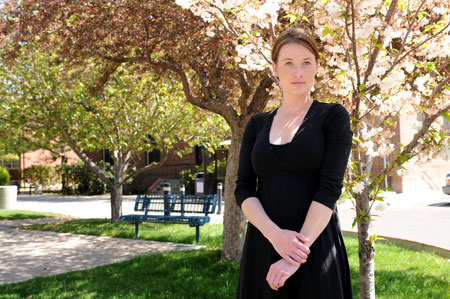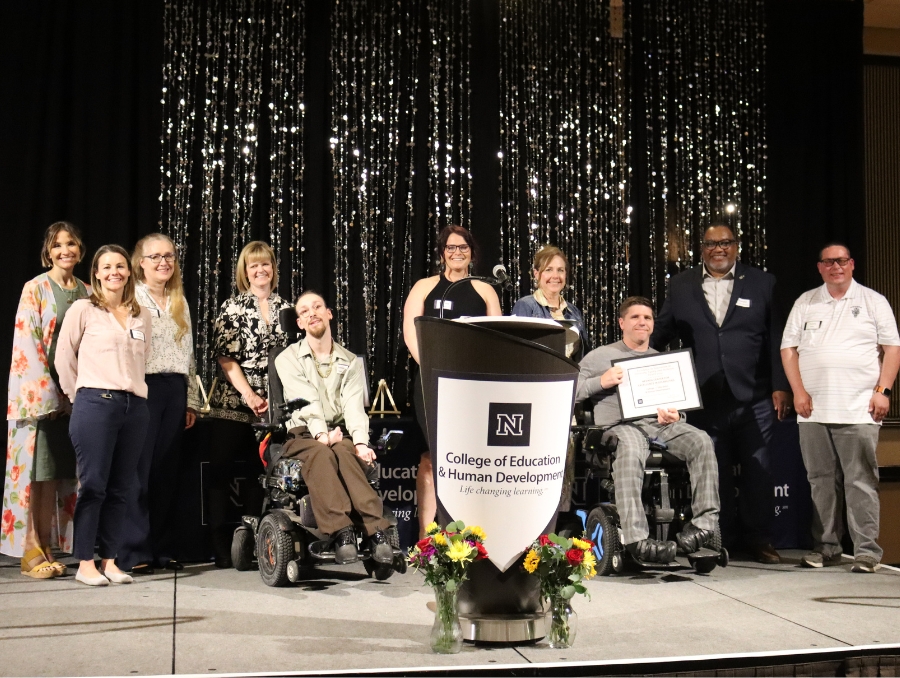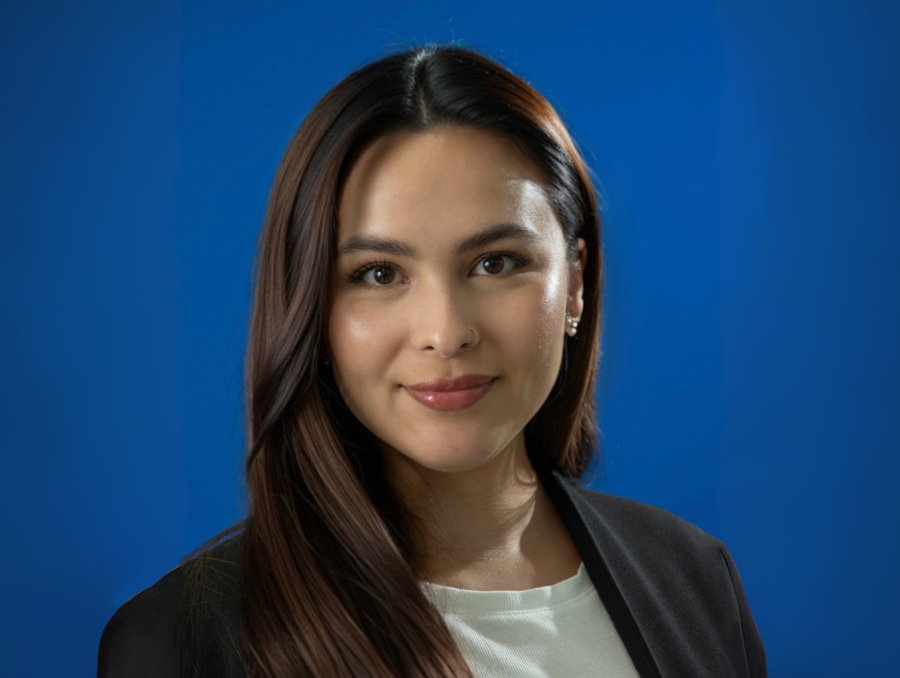With each passing class, Nichole Maloney was growing more and more upset.
The classes she had been taking this semester, Parastilogy and Malaria, taught by Biology Professor Robert Mead, were far from what she had expected.
The material was interesting. The instructor, one of the University’s most distinguished biology professors and a former dean, was demanding.
Yet, and this was the part that filled Maloney with varying degrees of frustration and sadness, there was little that seemingly could be done about the problem.
The statistics regarding malaria worldwide are staggering: a child dies of malaria every 30 seconds, more than 3,000 per day; more than one million people—mostly infants, young children and pregnant women, mostly in Africa— die of malaria every year.
“It just really started getting to me,” Maloney says. “Just the depth of what is going on outside of the United States. We don’t fully understand the depth of the problem at all.”
So, a couple of weeks into class, Maloney met with Mead.
Although the subject matter was difficult, she had already grown fond of her veteran professor. Everything about Mead is hard to dislike—from his quick laugh to his deep, philosophical understanding of his subject matter to his ability to connect with students.
Mead isn’t professor by PowerPoint. He prefers, instead, incredibly high standards. His syllabus for one of the courses Malone is taking this semester –- Biology 467: Malaria: Its Many Facets—is 24 pages long. He explains a recent midterm examination thusly: “It’s a take home test, and the take home test is a real challenge. It’s a really frustrating experience for them. Most of my students have never seen anything like it.”
The conversation
Against this background, Maloney decided it was best to be honest. To explain her frustrations to an incredibly honest man, a man, she says, is, “Very direct. I love his teaching style. Everything is written on the blackboard: ‘This is what you need to know.’ Plus, Dr. Mead has this wicked sense of humor that a lot of his students don’t get. I get it, though.”
The conversation was to the point.
“I went to talk to Dr. Mead and was kind of upset about what I’d been seeing and learning in his classes,” says Maloney, 26, a senior biology major from Portland, Ore. “I asked him several times, ‘What can we do about this problem in the world? What can we do?’”
Mead remembers the conversation as well. He remembers not only the words, but a deep sense of caring, a deep sense of duty to do more, that seemed to be coming from his student.
“I remember Nichole said that we were talking about millions of people being affected with these horrendous diseases,” Mead says.
He recounts the memory from his office on the second floor of the Mackay Science Building. His office is down the hall from a cavernous lecture hall, and has the look and feel of something much more intimate. His office looks like it is half-lab, and half-counseling center. A recliner—given to him after he stepped down as dean of the College of Arts & Science a few years ago -– is next to his desk. He prescribes its use for any student who wishes to come to visit him.
He continues, “Nicole was very upset about it. She said, ‘I walk around and it seems like no one in our country cares about this problem. I feel so helpless. What can I do? What can anybody like me do?’ And I said, ‘That’s not the right question, Nichole.’ She said, ‘Well, what is the right question?’”
Mead pauses. Throughout his career at Nevada, which spans more than 35 years, Mead has always felt that ultimately, his job has been about the students. He knew that if he didn’t phrase his next thought just right, his student might feel like there was no hope at all.
“What,” Mead remembers himself saying, “do you want to do?”
The answer
Mead wasn’t sure what Maloney’s answer would be.
It took the young woman several days to formulate an answer.
She remembered her background: at age 14, asked to volunteer 50 hours at an HIV/AIDS Hospice and soup kitchen in Portland, she had gone above and beyond … and volunteered 500 hours.
Her work at the “Peace House,” a 10,000-square-foot home for the terminally ill and a center for grief counseling, had taught her that she would probably, in her own words, never be the type of person “too concerned about my briefcase and having a 9 to 5 job.”
“Nichole has a great interest in humanity,” Mead says. “It’s there, and she has always been sensitive to it.”
A few days passed before Maloney shared her answer to his question, “What do you want to do?” She had some vague plans about relocating on the east coast, and pursuing her master’s degree. Suddenly, though, her priorities seemed to come into focus.
“I thought maybe moving back east would give me exposure to a different culture,” she says. “But it would still be the same Walmart's, Starbucks, the same Britney Spears that we are all exposed to. The classes I was taking from Dr. Mead had impacted me like no other. I do want to do something.”
“Nicole came back shortly before spring break, and she said she was applying to the Peace Corps,” Mead says, “and she asked me if I would write her a letter of recommendation.”
The conversation over the next hour was very similar to one of Mead’s frustrating midterm examinations. In his polite, collegial manner, Mead questioned Maloney’s decision. Her answers were as well thought out as her responses were for Mead’s midterm (she had received a 99 on that midterm, by the way, “and that’s not easy to get from me,” Mead says).
“I gave her a cross-examination on it, not in a hostile way, and she clearly had given it a lot of thought,” Mead says.
Maloney’s 27-month assignment with the Peace Corps will be in a sub-Saharan Africa country that is still to be determined. She will work on finishing her coursework this summer, graduate in August, and leave for her assignment in March.
Her choice of a sub-Saharan country in Africa is instructive, and illustrates her depth of commitment.
She also had the option of choosing a country in the Caribbean, which could have meant less culture shock, more opportunity to stay closer to the comforts of modern life.
“In the Caribbean, there is running water, electricity and no language requirement,” she says. “In Africa, you are pretty much guaranteed no running water or electricity and I will have to speak French. Africa, though, is where my heart is. I think I can make more of a difference there, and I think it will be more rewarding.
“I really hope that I am able to touch as many lives as possible while I’m there.”
Her work will center on education and awareness for infectious diseases such as HIV/AIDS.
“Nichole will do good work there because she has such a strong sense of cultural differences,” Mead says. “The education element, she has a clear understanding that you can’t just tell people to do something; you have to educate them in a way so that they know they will benefit from doing it.”
As the semester winds down, Mead sees a bright future for his student.
“I wouldn’t be surprised at all if, after her time in the Peace Corps, if she stays with some kind of international effort to improve quality of life,” he says. “I say that partly because of her previous volunteer work and just looking at her thinking about this.
“There is some irony to the fact that she has been studying malaria this semester, and while she is in Africa, she will probably get malaria, or diarrhea, perhaps from one of the parasites we’ve talked about in class. She’s going to have moments of misery. But on the other side of the coin, she’s going to come out this experience as a wonderful citizen, someone who is going to be very, very successful in what she does in life.”
For her part, Maloney is just thankful to have had a professor whose two classes made a profound difference in the direction of her life.
“There is a very good chance that I wouldn’t have done any of this without Dr. Mead,” she says. “Dr. Mead has a way of going beyond teaching the symptoms or the drugs of malaria. He teaches you so much more.”
So much more.
Although she is talking about her professor’s ability to reach into a subject matter to find its humanistic as well as scientific application, Maloney probably doesn’t realize that she could be describing someone else.
So much more.
Nichole Maloney.











